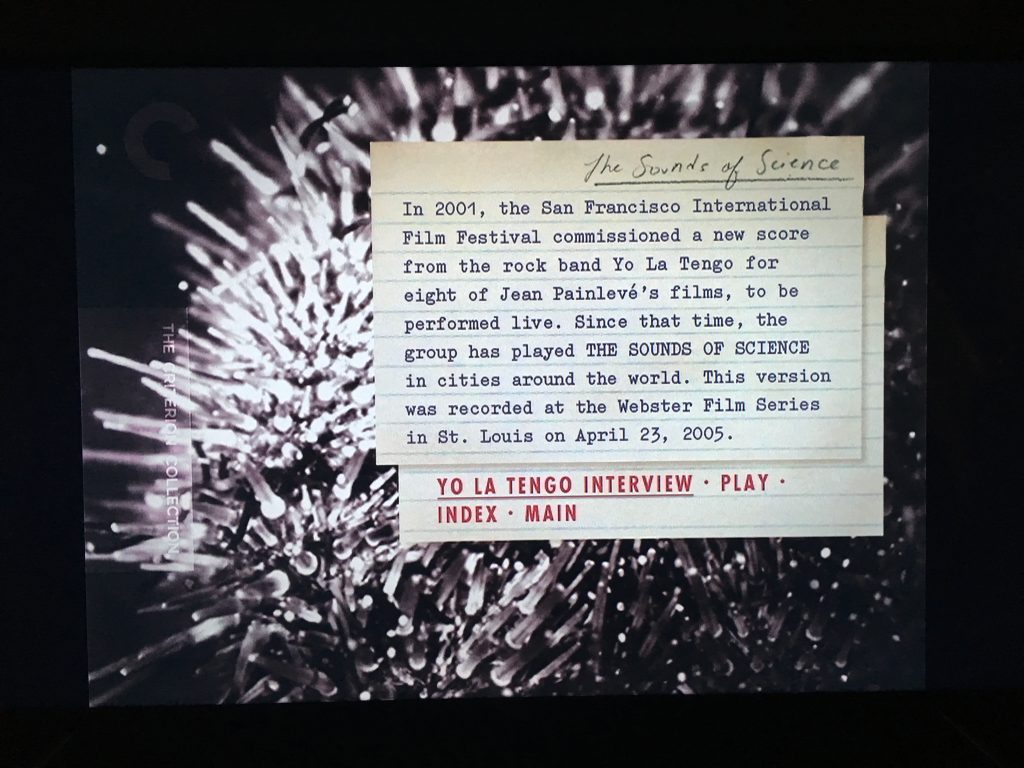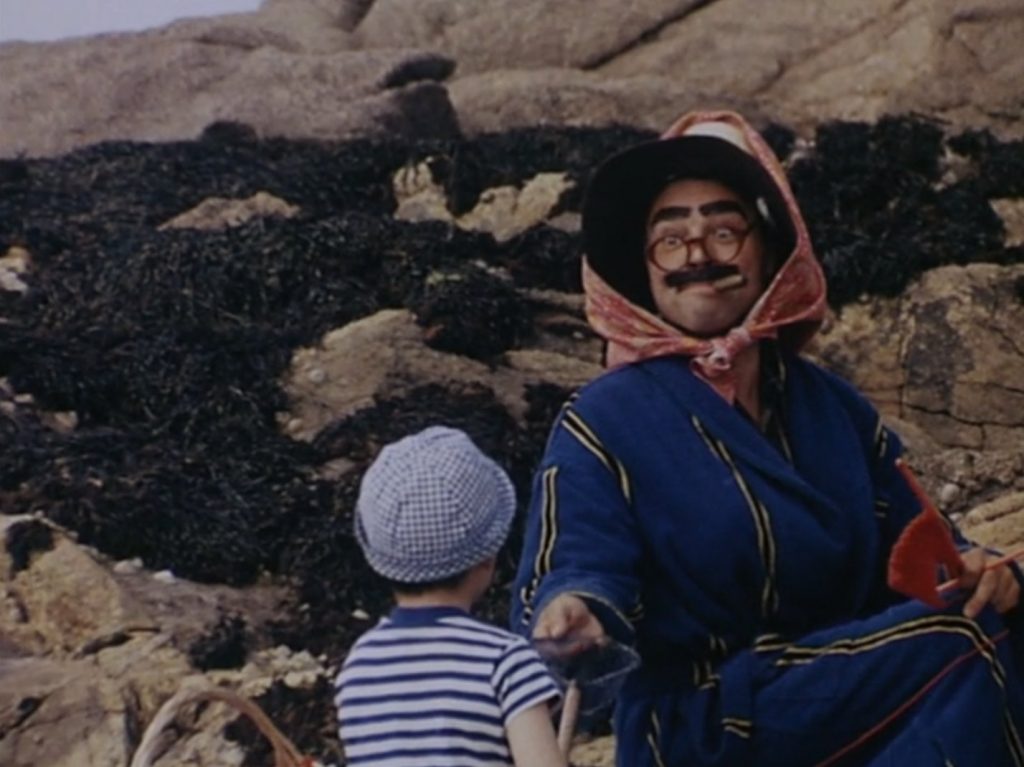While browsing through the oldest films available on Criterion’s new streaming service, I noticed several by Jean Painlevé.* These are from a DVD collection released in 2009 called Science Is Fiction: 23 Films by Jean Painlevé (parts also released earlier by BFI). From 1925 to 1982, Painlevé directed hundreds of short films, most around 10 minutes long.
The mesmerizing, utterly unclassifiable science films of Jean Painlevé (1902-89) have to be seen to be believed: delightful, surrealist-influenced dream works that are also serious science. The French filmmaker-scientist-inventor had a decades-spanning career in which he created hundreds of short films on subjects ranging from astronomy to pigeons to, most famously, such marine-life marvels as the sea horse and the sea urchin. This definitive three-disc collection brings together the best of these, and also includes the French television series Jean Painlevé Through His Films, rock band Yo La Tengo’s eight-film score The Sounds of Science, and an essay by film scholar Scott MacDonald.
The Criterion Collection
What really caught my attention was the mention of a new Yo La Tengo instrumental soundtrack. Most of the 3-disc collection is streaming on the Criterion Channel, but without the DVDs, I had to set up a makeshift version of The Sounds of Science. The CD is entitled The Sounds of The Sounds of Science (2002, 77 minutes).
More details about the album are listed on the Discogs database, where liner notes are even posted:
All songs written for The Sounds of Science which premiered at the San Francisco International Film Festival of 2001. This program consists of eight underwater documentaries by Jean Painlevé, with live accompaniment by us. Thanks to Doug Jones and Rachel Rosen.
Most songs recorded at the Bank of Woodland, Nashville. Track 5 recorded at Yo La Tengo’s practice space, USA.
Most songs mixed at the Bank of Woodland, Nashville. Tracks 3 and 8 mixed at Water Music, Hoboken.
The Sounds of The Sounds of Science, liner notes
In the track listing below, I’ve added the release year for each film title.
- Sea Urchins (10:22, 1928)
- Hyas and Stenorhynchus (9:16, 1927)
- Shrimp Stories (6:43, 1964)
- How Some Jellyfish Are Born (8:22, 1960)
- Liquid Crystals (8:54, 1978)
- The Love Life of the Octopus (11:59, 1967)
- Acera or The Witches’ Dance (8:15, 1972)
- The Sea Horse (13:18, 1933)
The CD track lengths are usually shorter than the original films on the Criterion Channel, so I just had to pause the tracks at the beginning or end of each film. It was a fun exercise to switch between the Yo La Tengo soundtrack (with Painlevé’s original subtitles), then over to original soundtrack (impressive in its own right) and narration.
Later, I got hold of the DVD version of The Sounds of Science (95 minutes). The track order is actually different than the album.** As you can see from the DVD screenshot below, the soundtrack for this version was recorded later, live in St. Louis on April 23, 2005. And like my original films/CD tracks makeshift mashup, the Yo La Tengo music doesn’t quite match up with the start or finish of any of the 8 short films cut together. Their style of music is experimental and improvised jazz rock, so I’m sure every live performance was quite unique.
The 10-minute interview with the band included in the DVD gives further insight into how the project came together.

2009 Criterion DVD menu for The Sounds of Science
Below is a good example of the style of most of Painlevé’s nature films. The Groucho-Marx-in-drag part took me by surprise! Press play on the Yo La Tengo video, then go to the Painlevé extract video, mute it and skip about 30 seconds in to get a feel for the mood of the soundtrack. Or just go to the YouTube Multiplier “mashup” that I created: Shrimp Stories a la Sounds of Science.

As a science enthusiast, the microscopic filming is super impressive to me, not to mention that many of these were done in the 1920’s and 1930’s.
One word of warning – several of the films include dissection of sea creatures, which can be disturbing to some viewers. I found it to be jarring, and it took away from the continuity of the basic documentation of the sea creatures’ lives.
Otherwise, there are so many things to love about Painlevé’s art and I keep going down rabbit holes to dig up whatever I can about his films. The 3-DVD Criterion set is a great starting point.
However, there is not a lot of info about Science Is Fiction on the Internet, and even less about The Sounds of Science. The most detailed review is by Chris Galloway on CriterionForum.org.
Denise Sullivan from Rolling Stone interviewed Yo La Tengo in May 2001, shortly after their first live performance of the album, with the films playing in the background. You can read that through a copy on Archive.org.
Amazon.com currently has 15 (mostly short) user reviews of the Science is Fiction set, and just one for The Sounds of the Sounds of Science.
The official Archives Jean Painlevé “carries out its mission by working on screenings, exhibitions and publications and assisting with research. It conserves an important collection of works, including thousands of film prints, original photographs and writings.”
As a side note, I thought I’d mention that the new Criterion Channel service has worked pretty well for me. It doesn’t buffer very well and is a little difficult to rewind just a few seconds to replay something you missed, but overall it’s a good design and they include a lot of extra features, as well.

* A user named Morbus Iff has posted all sorts of useful data from the Criterion API on Reddit. I was using their Google Sheets list of Criterion Channel videos when I noticed the Painlevé films.
** Track order on DVD: Hyas, Sea Urchins, How, Liquid, Sea Horse, Love, Shrimp, and Acera (titles shortened by me)
